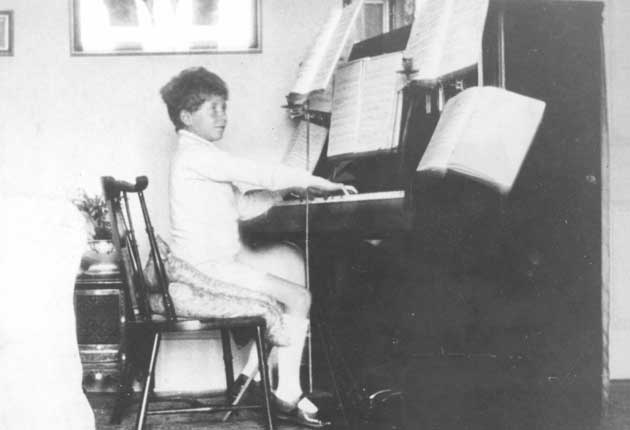Britten, the boy wonder
Music the composer wrote as a child can now be heard for the first time. It shows a precocious genius, says Lynne Walker

What more is there left to know about Benjamin Britten, one of the greatest 20th-century composers? A new exhibition tracing his early development reveals that he wrote far more music as a boy than previously realised. Young Britten: Schoolboy, Composer illuminates how, even as a child, Britten covered reams of manuscript paper with "dots and dashes".
Here, according to Dr Lucy Walker, who has helped piece together this jigsaw of juvenilia for the Britten Thematic Catalogue, his inclination towards vocal works is already in surprising evidence. The boy composer's deft way with words, his distinctiveness as a melodist and his lifelong affinity with song – an interest kindled perhaps by his singer mother and later celebrated in the lyrical works he wrote for his singer-partner Peter Pears – began when he was six, with a ditty about rabbits.
From the earliest surviving work, "Do you no that my Daddy has gone to London today", dating from 1919, to his official opus one, the amazingly accomplished Sinfonietta of 1932, the year he left the Royal College of Music, there is a selection from an astonishing 730 pieces of music. Only now have many of these largely unpublished and often tantalisingly unfinished compositions been nailed to specific years in Britten's early life.
1925, for instance, was unqestionably an annus mirabilis, in which he composed obsessively, producing no fewer than 125 works, mainly for piano but also for voice and choir. Any ordinary parent might have been justifiably worried.
Britten was a compulsive hoarder andYoung Britten: Schoolboy, Composer includes misspelt correspondence, photos, diaries and other mementoes including the wartime ration book he preserved from 1918. An old school jotter, reused in 1966, contains sketches for his church parable The Burning Fiery Furnace.
Now the Britten-Pears Foundation, with an eye on 2013, the centenary of Britten's birth, has unveiled plans for a new purpose-built Archive Centre to be developed on land adjoining the Red House, which Britten shared with Pears for nearly 20 years. The preliminary costs for the project are somewhere in the region of £5.5m, of which £2m will be found from the Foundation's funds.
The Centre will house some 80,000 pieces of correspondence, over 10,000 photos, Britten's collection of rare books, and 2,000 works of modern British art collected mainly by Pears, as well as countless manuscripts, scores and set models including Kenneth Green's for the 1945 premiere of Peter Grimes. The centre will use the latest energy-saving conservation methods while making this vast resource – the most comprehensive collection of any composer in the world – far more attractive and accessible to a wider public.
Crucially, it will also allow Britten's composing studio in the Red Cottage adjoining the Red House to be reclaimed. Not before time, the spirit of Britten will be properly restored to the Red House and those who visit will be able to experience the views that inspired him, along with a lifetime of precious and astonishingly precocious creativity.
Though it's not always sensible to search for echoes of Britten's mature style in his early works, it's hard not to imagine glimpses of later great pieces in this cornucopia of compositions by a musical Suffolk schoolboy.
Until 11 December, the Red House, Aldeburgh (01728 451700). From mid-July an online version, including audio clips, can be found at www.brittenpears.org
Join our commenting forum
Join thought-provoking conversations, follow other Independent readers and see their replies
Comments
Bookmark popover
Removed from bookmarks